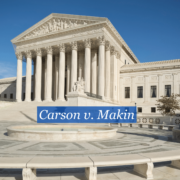U.S. Supreme Court Invalidates Minnesota Tax Foreclosure Scheme
Ruling could impact Worcester homeowner’s suit against city and private tax lien buyer
BOSTON, May 26, 2023 – The United States Supreme Court today struck down Minnesota’s tax foreclosure scheme, ruling that a Minnesota homeowner who lost her home to a tax foreclosure was entitled to the surplus from the home’s sale.
In Tyler v. Hennepin County, Geraldine Tyler lost her home valued at $40,000 because she had not paid $15,000 in property taxes.
“The Court sent a clear message today, ruling unanimously that any surplus beyond the tax debt should be returned to the homeowner,” said Pioneer Public Interest Law Center President Frank Bailey.
The Supreme Court’s ruling could affect a Massachusetts case filed in U.S. Bankruptcy Court earlier this month. There, homeowner Carmen Rodriguez sued the City of Worcester and a tax lien buyer, Tallage Davis, LLC, seeking to invalidate a state statute that allows municipalities to confiscate people’s homes — including all the equity built up over many years — when they fall behind on their real estate taxes. Ms. Rodriguez is represented by the Pioneer Public Interest Law Center, Morgan, Lewis & Bockius LLP and Greater Boston Legal Services.
Ms. Rodriguez has owned her Worcester home for decades. She raised her family there and paid the mortgage in full. When she became ill and had to leave her job at the TJ Maxx warehouse where she worked for 37 years, she fell behind in her city real estate taxes, but she was not terribly worried because she owed only about $2,600 and her house was worth $200,000 to $300,000.
Worcester, however, quickly moved ahead with a little-known practice of selling its right to foreclose on Ms. Rodriguez’s home to Tallage Davis, LLC, a Boston-based tax title buyer. Tallage soon took title to the house and commenced eviction proceedings against Carmen and her son, seeking to remove her from the house during the 2022 holidays.
Ms. Rodriguez continued to make payments to Worcester even after Tallage filed a tax foreclosure, as she was unaware that the company was trying to foreclose on her home.
Ms. Rodriguez is not alone in her efforts to invalidate what many have called the “equity theft process.” Approximately 13 states have laws that allow equity theft.
In the U.S. Supreme Court case, Geraldine Tyler, an elderly Minnesota woman, lost her home under that state’s statute, which tracks the Massachusetts law. Like Ms. Rodriguez, Tyler argued that statutes such as these violate state and federal constitutional provisions that prohibit the taking of property without just compensation and the charging of unreasonable fines. Today’s decision found that Minnesota violated the U.S. Constitution when it took the entire value of her home for the taxes.
“I appreciate that the U.S. Supreme Court ruled that homeowner’s have rights and they should not lose the entire value of their home for a small amount of taxes owed,” Rodriguez said. “I am fortunate to have great team of lawyers in my corner to show how unjust this is. Hopefully it will never happen to another homeowner in Massachusetts.”
Carmen Rodriguez was preparing to move out of her home prior to accessing legal assistance.
“The process used by Worcester does not even benefit the city’s citizens, because while Worcester received less than $4,000, Tallage took the deed to Carmen’s home worth about $300,000,” said Todd Kaplan of Greater Boston Legal Services. “This process makes no economic sense for Massachusetts communities; it only enriches people like those who own Tallage.”


